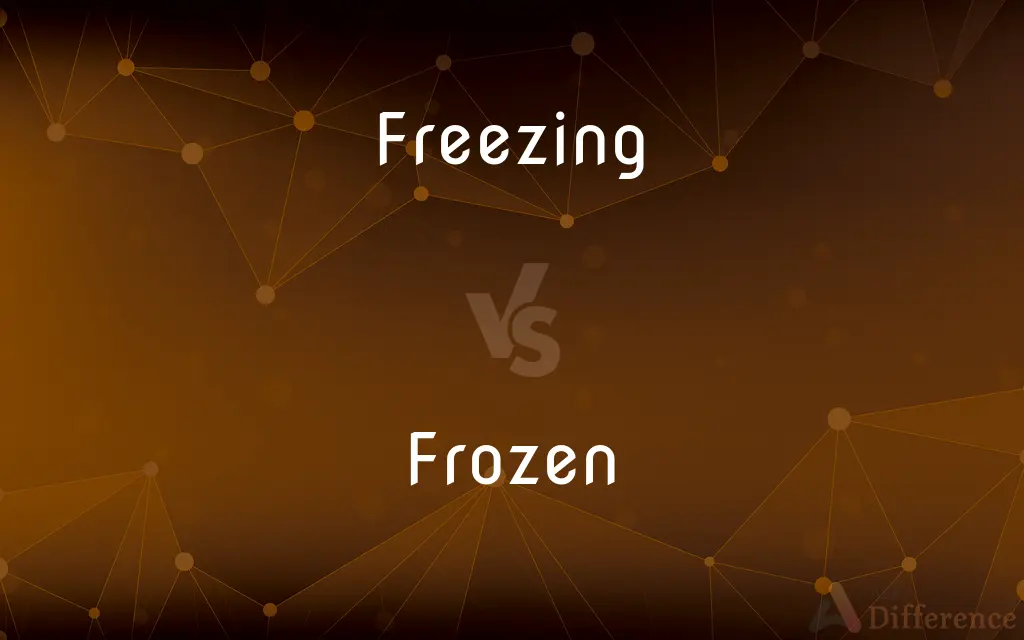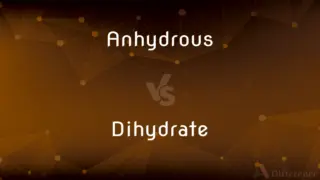Freezing vs. Frozen — What's the Difference?
By Urooj Arif & Maham Liaqat — Updated on March 7, 2024
Freezing is the process of becoming solid due to cold, while frozen describes the state of being solid from cold.

Difference Between Freezing and Frozen
Table of Contents
ADVERTISEMENT
Key Differences
Freezing refers to the dynamic process where a liquid turns into a solid when its temperature drops below its freezing point, which for water is 0°C (32°F). On the other hand, frozen is the state that results after the freezing process has completed, indicating that the substance is now solid and has been exposed to temperatures below its freezing point for a sufficient duration.
While freezing emphasizes the action or transition from liquid to solid, frozen focuses on the condition or result of that action, implying that the substance has already undergone the transformation and is now in a solid state.
Freezing involves a change in the physical state that is ongoing and requires the removal of heat from the substance. Conversely, frozen implies that the transition is complete, and the substance has reached a stable, solid form, often requiring sustained cold temperatures to maintain this state.
The term freezing is often used in contexts where the rate, conditions, or implications of the process are under consideration, such as in weather forecasts or scientific experiments. Frozen, however, is commonly used to describe food preservation, ice formations, or any scenario where the solid state is a key aspect.
Freezing processes can be reversible, where the substance can return to its liquid form if the conditions change, such as an increase in temperature. Frozen items, while they can also be thawed, typically refer to a more static condition, where the emphasis is on the current solid state rather than the potential for change.
ADVERTISEMENT
Comparison Chart
Definition
Process of becoming solid due to cold.
State of being solid from cold.
Focus
On the action or transition.
On the result or condition.
State
Dynamic, changing.
Static, unchanging.
Temporal Aspect
Ongoing process.
Completed process.
Contextual Usage
Weather forecasts, scientific experiments.
Food preservation, ice formations.
Compare with Definitions
Freezing
The process of turning into ice or another solid as a result of extreme cold.
The freezing temperatures overnight turned the puddle into a sheet of ice.
Frozen
Describes food that has been preserved by freezing.
They stocked up on frozen vegetables for the winter.
Freezing
In technology, it can refer to the solidification of data or states.
The system is freezing operations until the error is fixed.
Frozen
Metaphorically, it can describe a fixed state or inaction.
The negotiations were frozen with no progress in sight.
Freezing
In weather terms, it refers to the point at which water becomes solid.
Freezing rain caused dangerous driving conditions.
Frozen
Used to describe something immobilized or made rigid by cold.
His fingers were frozen after the long hike in the snow.
Freezing
In cooking, it refers to the preservation method by cold.
Freezing the leftovers will keep them edible for months.
Frozen
Having been turned into ice or another solid as a result of extreme cold.
The lake was completely frozen over by January.
Freezing
Used metaphorically to describe very cold temperatures.
The freezing office made everyone wear their coats indoors.
Frozen
In finance, it refers to assets that are made unavailable.
The company's assets were frozen pending the investigation.
Freezing
Freezing is a phase transition where a liquid turns into a solid when its temperature is lowered below its freezing point. In accordance with the internationally established definition, freezing means the solidification phase change of a liquid or the liquid content of a substance, usually due to cooling.
Frozen
Past participle of freeze.
Freezing
To pass from the liquid to the solid state by loss of heat.
Frozen
Made into, covered with, or surrounded by ice.
Freezing
To acquire a surface or coat of ice from cold
The lake froze over in January. Bridges freeze before the adjacent roads.
Frozen
Very cold
The frozen North.
Freezing
To become clogged or jammed because of the formation of ice
The pipes froze in the basement.
Frozen
Preserved by freezing
Frozen meat.
Freezing
To be at that degree of temperature at which ice forms
It may freeze tonight.
Frozen
Rendered immobile
Frozen in their tracks with fear.
Freezing
To be or feel uncomfortably cold
Aren't you freezing without a coat?.
Frozen
Immobile, as from pain or inflammation. Used of a joint
A frozen shoulder.
Freezing
To become fixed, stuck, or attached by or as if by frost
The lock froze up with rust.
Frozen
Expressive of cold unfriendliness or disdain
A frozen look on their faces.
Freezing
To stop functioning properly, usually temporarily
My computer screen froze when I opened the infected program.
Frozen
Kept at a fixed level
Frozen rents.
Freezing
To become motionless or immobile, as from surprise or attentiveness
I heard a sound and froze in my tracks.
Frozen
Impossible to withdraw, sell, or liquidate
Frozen assets.
Freezing
To become unable to act or speak, as from fear
Froze in front of the audience.
Frozen
Having undergone the process of freezing; in ice form.
The mammoth has been frozen for ten thousand years.
Freezing
To become rigid and inflexible; solidify
An opinion that froze into dogma.
Frozen
Immobilized.
I just stood frozen as the robber pointed at me with his gun.
Freezing
To convert into ice.
Frozen
(of a bank account or assets) In a state such that transactions are not allowed.
Freezing
To cause ice to form upon.
Frozen
(grammar) Retaining an older, obsolete syntax of an earlier version of a language, which now operates only on a specific word or phrase.
"Dice" is a frozen plural.
Freezing
To cause to congeal or stiffen from extreme cold
Winter cold that froze the ground.
Frozen
Congealed with cold; affected by freezing; as, a frozen brook.
They warmed their frozen feet.
Freezing
To preserve (foods, for example) by subjecting to freezing temperatures.
Frozen
Subject to frost, or to long and severe cold; chilly; as, the frozen north; the frozen zones.
Freezing
To make very cold; chill.
Frozen
Cold-hearted; unsympathetic; unyielding.
Be not ever frozen, coy.
Freezing
To immobilize, as with fear or shock.
Frozen
Turned into ice; affected by freezing or by long and severe cold;
The frozen North
Frozen pipes
Children skating on a frozen brook
Freezing
To chill with an icy or formal manner
Froze me with one look.
Frozen
Absolutely still;
Frozen with horror
They stood rooted in astonishment
Freezing
To stop the motion or progress of
The negotiations were frozen by the refusal of either side to compromise.
Froze the video in order to discuss the composition of the frame.
Frozen
Devoid of warmth and cordiality; expressive of unfriendliness or disdain;
A frigid greeting
Got a frosty reception
A frozen look on their faces
A glacial handshake
Icy stare
Wintry smile
Freezing
To fix (prices or wages, for example) at a given or current level.
Frozen
Not thawed
Freezing
To prohibit further manufacture or use of.
Frozen
Used of foods; preserved by freezing sufficiently rapidly to retain flavor and nutritional value;
Frozen foods
Freezing
To prevent or restrict the exchange, withdrawal, liquidation, or granting of by governmental action
Freeze investment loans during a depression.
Froze foreign assets held by US banks.
Frozen
Not convertible to cash;
Frozen assets
Freezing
To anesthetize by chilling.
Frozen
Incapable of being changed or moved or undone; e.g.
Frozen prices
Living on fixed incomes
Freezing
(Sports) To keep possession of (a ball or puck) so as to deny an opponent the opportunity to score.
Freezing
The act of freezing.
Freezing
The state of being frozen.
Freezing
A spell of cold weather; a frost.
Freezing
A restriction that forbids a quantity from rising above a given or current level
A freeze on city jobs.
A proposed freeze on the production of nuclear weapons.
Freezing
(literally) Suffering or causing frost
Freezing
Very cold
Freezing
Zero °C, the freezing point of water.
Freezing
The change in state of a substance from liquid to solid by cooling to a critically low temperature.
Freezing
The action of numbing with anesthetics.
Freezing
Present participle of freeze
Freezing
Tending to freeze; for freezing; hence, cold or distant in manner.
Freezing
The withdrawal of heat to change something from a liquid to a solid
Common Curiosities
What is the difference between freezing and frozen?
Freezing is the process of turning liquid into solid due to cold, whereas frozen describes the state of being solid after this process.
Why is the distinction between freezing and frozen important?
The distinction clarifies whether a substance is undergoing the transition to a solid state (freezing) or has already become solid (frozen).
How does temperature affect freezing and frozen states?
Temperature below the freezing point initiates the freezing process, and maintaining this low temperature keeps substances frozen.
How do animals adapt to freezing and frozen environments?
Animals have various adaptations, such as antifreeze proteins or insulating layers of fat, to survive in freezing or frozen conditions.
What are common uses of freezing in daily life?
Freezing is commonly used for food preservation, recreational ice activities, and in certain industrial processes.
Can something be freezing and frozen at the same time?
Generally, freezing refers to the ongoing process, and frozen describes the end result, so they represent different stages.
Is freezing always a slow process?
The rate of freezing can vary depending on the conditions, including temperature, pressure, and the presence of nucleation sites.
What role does freezing play in weather phenomena?
Freezing is central to the formation of snow, ice, frost, and other cold weather phenomena.
How do humans artificially create freezing and frozen conditions?
Humans use refrigeration and freezing technologies to create these conditions for purposes like food storage and climate control.
What are the environmental impacts of freezing and frozen conditions?
Freezing and frozen conditions can shape landscapes, influence climate patterns, and affect ecosystems and biodiversity.
Can all liquids undergo freezing?
Most liquids can freeze under the right conditions, but the specific freezing point can vary widely between substances.
How do freezing and frozen states affect transportation?
They can create hazardous conditions, such as icy roads and frozen waterways, impacting travel and shipping.
Are there any health benefits or risks associated with freezing and frozen states?
Freezing preserves food and prevents spoilage, but extreme cold can pose health risks like frostbite and hypothermia.
Can freezing be used in medical treatments?
Yes, techniques like cryotherapy use freezing for therapeutic purposes, including treating skin conditions and reducing pain.
Can freezing damage materials or structures?
Yes, freezing can cause damage, especially due to the expansion of water as it freezes, which can lead to cracks and breaks.
Share Your Discovery

Previous Comparison
Shiplap vs. Beadboard
Next Comparison
Anhydrous vs. DihydrateAuthor Spotlight
Written by
Urooj ArifUrooj is a skilled content writer at Ask Difference, known for her exceptional ability to simplify complex topics into engaging and informative content. With a passion for research and a flair for clear, concise writing, she consistently delivers articles that resonate with our diverse audience.
Co-written by
Maham Liaqat










































